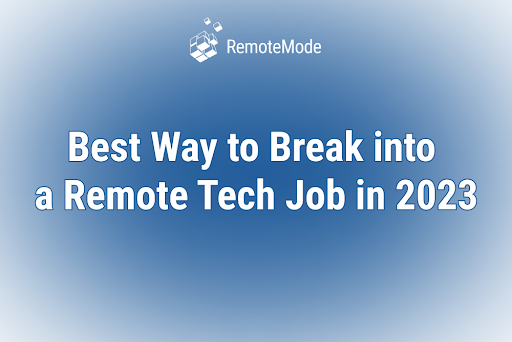Best Way to Break into a Remote Tech Job in 2023

If you have been following this blog or watching employment trends on the internet, you know that technology jobs are exploding in every industry right now.
Many people think that transitioning into a technology career means they have to go to a university for four years and earn a degree in computer science or information technology. While a university education can be a positive step towards a tech career, it is by no means the only—or even the best—approach.
In the article below, we’ll explore some of the myths about why people think it’s hard to pivot to a remote tech job. And we’ll reveal at the end the best option for getting a job in tech with zero technical work experience.
Myth #1 – You have to be young to get into tech
A pervasive belief haunts the tech industry that it is only for young people. It's no secret that the tech industry has been criticized for being ageist. Many think that those over the age of 35 are too old to be hired. This has made it difficult for more experienced workers to break into an industry that appears to favor younger candidates.
This belief is not true, however. Anyone, regardless of age, can pursue a career in IT. Although some recruiters may prefer younger candidates, many companies have revised their recruitment strategies to be more inclusive.
According to data from the U.S. Bureau of Labor Statistics, the median age of people in various IT occupations is between 30 and 40, with some individuals in their 50s and 60s working in the field. It's worth noting that these statistics are based on a small sample of people in a single country, and there are IT specialists worldwide.
The tech industry welcomes anyone who is willing to learn and work hard, regardless of their age. While certain skills may be required to land a job, acquiring them need not take years. Ultimately, the tech industry offers opportunities for anyone who is passionate about the field. Age is not a limiting factor.
Myth #2 – Minorities are not welcome
Many people believe that minorities are not interested in pursuing careers in the tech industry. In fact, 74% of girls in the United States express an interest in STEM in middle school, but only 0.4% of them select computer science as their college major. Moreover, studies have shown that college-bound African Americans and other racial minorities are slightly more interested in science and engineering than Caucasians, with 52.6% of Asians and 37.5% of African Americans/Hispanics declaring their intent to major in science and engineering compared to 34.7% of Caucasians
Because many perceive the tech industry as lacking in diversity, especially in terms of gender and race, this perception can discourage blacks, indigenous, and people of color (BIPOC) from pursuing tech careers due to concerns about being treated unfairly and facing discriminatory practices. This perception, however, does not align with reality. For example, the tech industry has a significant number of women working in various roles, including as founders, CEOs, and leaders. Social support structures like Women in Technology also help women in tech connect with each other and build a community.
Furthermore, the tech industry is steadily becoming more diverse. The Wall Street Journal reports that between 41% and 69% of employees at nine of the largest tech companies are of minority races, and between 27% and 37% of leadership positions are occupied by minority employees.
Diversity, equity, and inclusion (DEI) have become increasingly critical in the tech industry. Companies are beginning to recognize the importance of DEI, and initiatives and programs are being developed to address the issue. In short, the myth that minorities are not interested in tech is simply not true, and the tech industry is more diverse than many people realize.
Myth #3 – You need to have a tech degree
The notion that a tech career necessitates a degree is a common misconception. While a degree in Computer Science may offer advantages, it is not a requirement for most IT jobs. What matters most to recruiters are the individual's skills and experience. Building a strong portfolio and gaining work experience can set you on the path to a rewarding tech career.
Furthermore, traditional education is just one of many avenues for acquiring the knowledge and skills required for a career in tech. Online courses, offline schools, and bootcamps can all provide valuable instruction. Alternatively, self-education through books, podcasts, and YouTube videos is a feasible option. The outcome of these learning experiences might not be a formal degree, but rather, a set of practical skills that can be put to use in the industry.
Whether you have a degree or not, the tech industry is open to all who have the skills and knowledge to contribute.
Myth #4 – You Need a Lot of Money to Learn Tech
While some alternative education programs may come with hefty price tags, don't let the cost deter you from pursuing your passion for tech. There are plenty of affordable options out there, including free coding courses and local meetups where you can learn collaboratively. Adult education classes and seminars are also excellent resources to explore.
If you're interested in an intensive bootcamp program, there are often scholarships available, or you can look for ones that fit your budget. Regardless of your financial situation, don't let money be the thing that holds you back from achieving your goals. With determination and perseverance, you can acquire the skills and knowledge you need to succeed in the tech industry.
Final Thoughts:
The point is, you do not have to be of any particular age group or ethnicity, have code running through your veins, or live in a large metropolitan area to get a job in tech.
The only true requirement for successfully starting a tech career is skills. Marketable skills come from exceptional training, and the premier remote training company for technical skills is RemoteMode. We offer a variety of courses in high-demand areas such as Java and Python development, DevOps and Cloud engineering, and security. Our courses are taught by industry professionals with real-world experience.
By taking advantage of RemoteMode’s remote training programs, you can gain the skills needed to succeed in the tech industry from anywhere in the world, regardless of your background or location. With hard work, dedication, and the right training, you can start a successful career in tech and achieve your professional goals. Contact Remotemode today and choose the tech career that will put you on the path to success.
Take the first step to your new remote career!






